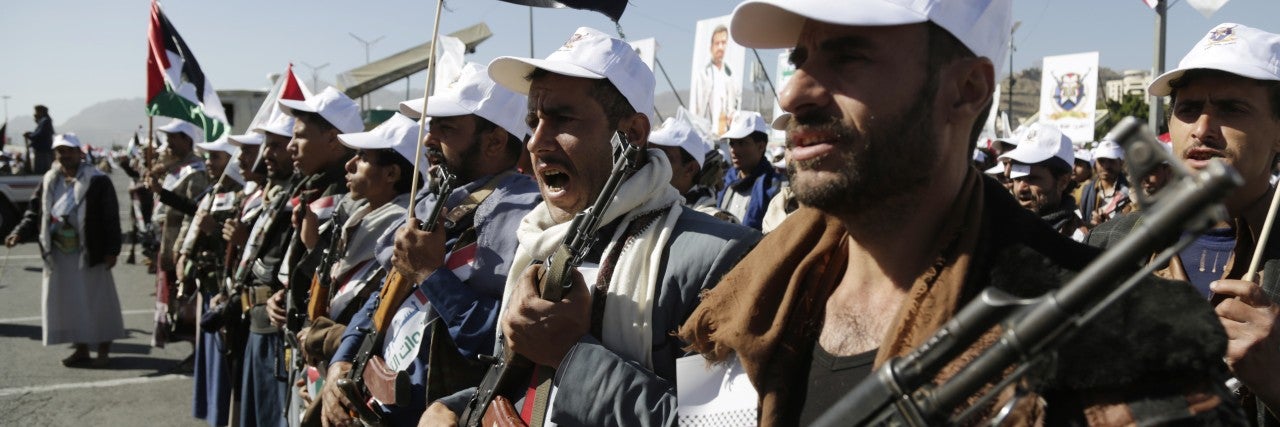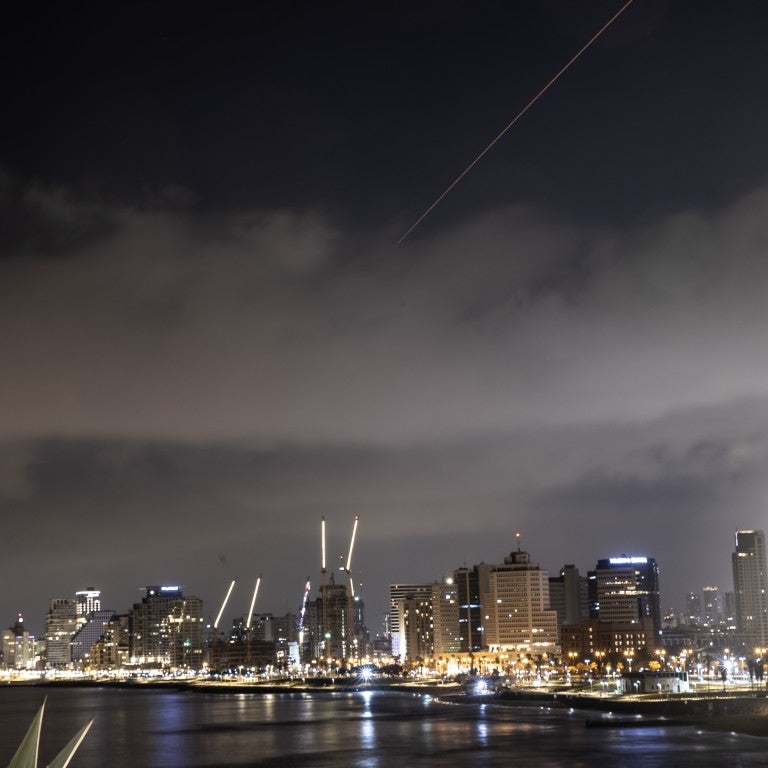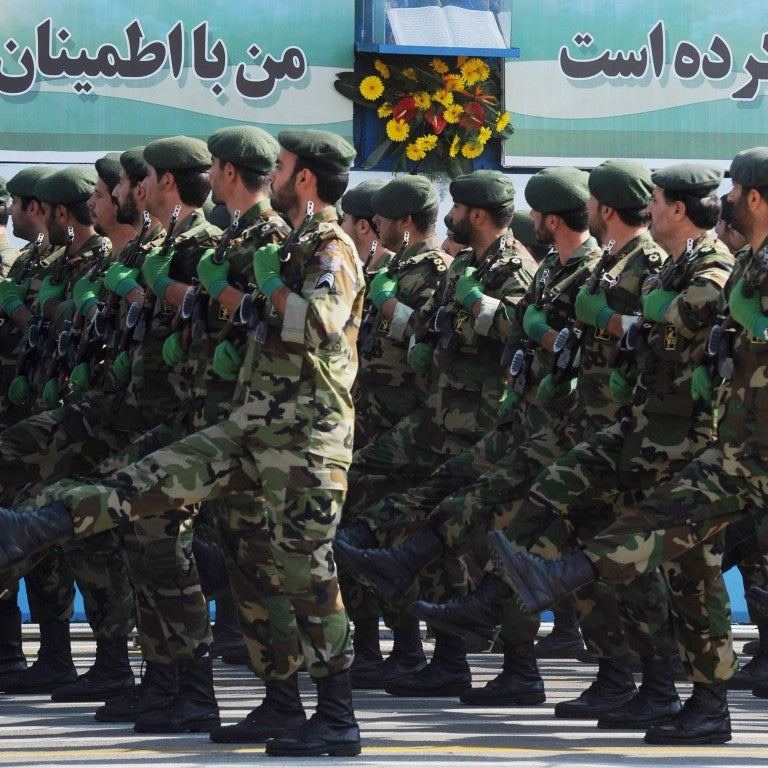January 17, 2024
The Houthis are an extremist Shia-Islamist movement and terrorist army. Backed by Iran, this organization controls approximately one-third of Yemen’s territory and more than two-thirds of the country’s population. It has emerged as a prominent player in the Israel-Hamas war, which began on October 7 with a mass murder attack by Hamas on Israelis.
In recent weeks, Houthi terrorists have fired near daily ballistic missiles and suicide drones at Israel and ships in the Red Sea – most of them intercepted by Israel’s multi-layered air defense system or U.S. warships in the Red Sea – and have violated international maritime law by hijacking commercial ships sailing in the Red Sea, posing a direct threat to international shipping and the global economy.
As a result of this threat, the U.S. announced on December 18, 2023, the expansion of a multinational maritime security force to protect ships in the Red Sea and the Gulf of Aden from Houthi attacks. On January 11, this U.S.-led coalition launched more than a dozen strikes on Houthi rebel targets in Yemen after the group defied an ultimatum to halt its attacks on ships transiting the Red Sea.
The Biden administration also re-designated the Houthis as a Specially Designated Global Terrorist (SDGT) entity on January 17th.
“These attacks are clear example of terrorism and a violation of international law and a major threat to lives, global commerce, and they jeopardize the delivery of humanitarian assistance,” a US senior administration official said.
Here are five facts about the Houthis and the threat they pose to Israel and the international community.
1. What are the Houthis?
Made up of members of Yemen’s Shia-Zaidi minority group in the Saada district of northern Yemen, the Houthis have gained considerable power and influence over the last several years amid the ongoing civil war in Yemen. They are receiving Iranian funding, weapons, and training, posing a growing challenge to regional stability and global security.
According to the Alma Research and Education Center, initially a neglected group, the Houthis capitalized on the Arab Spring's momentum in the early 2010s to strengthen their position. By the end of 2014, they had taken control of Yemen's capital, Sanaa, and by February 2015, they declared control over the country. This power shift was supported by Iranian influence and aid from Iran’s Lebanese terror proxy, Hezbollah.
Listen to AJC's People of the Pod
2. Who finances the Houthis?
Iran's involvement has been pivotal in the rise of the Houthis and has created a significant destabilizing factor in the region. Tehran's support included arming the group with advanced weaponry and facilitating training by Hezbollah operatives. This backing transformed the Houthis into a formidable force that has challenged the Saudi-led Sunni Muslim alliance in the Arab Gulf region.
In particular, Iran, which is Persian and Shia Muslim, and Saudi Arabia, which is Arab, Sunni Muslim and home to the two holiest cities in Islam - Mecca and Medina - have emerged as regional rivals. While the two countries restored diplomatic relations in early 2023, the Saudis remained concerned about Iran’s pursuit of nuclear weapons and its support for terrorist groups throughout the Middle East.
Saudi Arabia intervened militarily in Yemen in 2015 to counter Houthi rebels aligned with Iran and support the internationally recognized government.
3. How powerful are the Houthis?
The Houthis have demonstrated significant military capabilities, particularly in their use of ballistic missiles, cruise missiles, and armed unmanned aerial vehicles (UAVs). These weapons have been deployed against various targets, including Israel, Saudi Arabia, and the United Arab Emirates. The group's ability to launch long-range attacks highlights its growing strength and powerful weapons.
Since Hamas began a war against Israel on October 7, the Houthis, out of solidarity with Hamas, have consistently attacked Israel with missiles and suicide drones. U.S. and Israeli air defenses have proven capable of dealing with the threat so far.
On December 7, for example, the Israeli Air Force’s Aerial Defense Forces intercepted a surface-to-surface missile launched toward Israeli territory in the Red Sea area. This interception was carried out using the Arrow defense system with assistance from the Iron Dome system. The IDF described the Houthis as an instrument of “regional terrorism – directed, funded, and orchestrated by Iran. It is a global problem – affecting all parts of the region. Our talks with the United States Central Command, as we understand, are already leading to the establishment of task forces in the Red Sea and other areas to address the issue. We are on a high level of preparedness in all sectors, both defensively and offensively.”
4. What threat do the Houthis pose to Israel and the world?
Yemen's strategic location, including its control over the Bab el-Mandeb Strait and proximity to the Red Sea, a vital waterway for global commerce from Asia to Europe through Egypt’s Suez Canal, amplifies the Houthis' potential impact on regional stability. The Suez Canal sees 50-60 vessels transiting each day, about 19,000 each year, including about 30% of global container traffic. Additionally, about 10 percent of global seaborne oil flows through this region.
Their aggressive actions, such as launching missiles toward Israel and other countries and attacking and hijacking commercial vessels, underscore the group's intent to extend its influence beyond Yemen's borders.
Israel's southern city of Eilat is a crucial hub for trade with Asia because it's located on the Red Sea, which directly connects with the Indian Ocean and points east. The leadership of the Houthis has said they would target all ships heading to Israel, regardless of their nationality.
This expansionist approach has raised concerns about the wider implications for global stability.
5. What are the goals of the Houthis?
The Houthi movement's ideology is deeply rooted in antisemitic, Islamic fundamentalist, anti-American sentiment, as reflected in the slogan on its flag: “Allah is great, death to the USA, death to Israel, curse the Jews, victory to Islam.” This extremist stance aligns with Iranian interests and suggests a broader objective of promoting Iran’s radical Islamist revolution throughout the Middle East.
The Houthi rebels in Yemen have been associated with antisemitic rhetoric and actions, raising concerns for the country's tiny remaining Jewish community. While the majority of Yemen's Jewish population, which once totaled 50,000, had left decades ago, the small amount that has remained has come under increasing persecution which started under former President Ali Abdullah Saleh but intensified under the Houthis, including the imprisonment of Levi Marhabi, who has been held by the Houthis since 2016, according to a United Nations report released in 2022. Additionally, the Houthis have also targeted other religious minorities, including Christians and members of the Baha’i community.
The Houthis want to control the region and often disrupt Yemen's stability and neighboring countries' security. They pose a major challenge in the Middle East, getting support from Iran and following an ideology that aims to reshape the region through destruction and warfare.
Following its December 18 announcement, the United States is currently assembling a naval taskforce. Countries including the UK, Canada, France, Bahrain, Norway, and Spain have joined. The mission is to patrol the Red Sea and assist future commercial ships that come under attack from this terrorist army.
On January 11, this U.S.-led coalition launched more than a dozen strikes on Houthi rebel targets in Yemen after the group defied an ultimatum to halt its attacks on ships transiting the Red Sea. These strikes “targeted radar systems, air defense systems, and storage and launch sites for one way attack unmanned aerial systems, cruise missiles, and ballistic missiles,” said U.S. Central Command.
The Houthis have carried out at least 27 attacks on commercial ships since mid-November. In recent weeks, the U.S. Navy has said it had shot down 61 missiles and drones.
“These targeted strikes are a clear message that the United States and our partners will not tolerate attacks on our personnel or allow hostile actors to imperil freedom of navigation in one of the world’s most critical commercial routes,” President Biden said in a statement.





